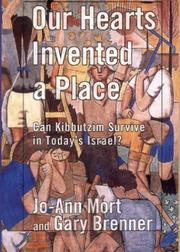| Listing 1 - 3 of 3 |
Sort by
|
Book
ISBN: 9781407313153 1407313150 Year: 2014 Volume: 2673 Publisher: Oxford Archaeopress
Abstract | Keywords | Export | Availability | Bookmark
 Loading...
Loading...Choose an application
- Reference Manager
- EndNote
- RefWorks (Direct export to RefWorks)
Fortification --- Coast defenses --- Military archaeology --- Excavations (Archaeology) --- Islamic antiquities --- Fortifications --- Défense côtière --- Archéologie militaire --- Fouilles (Archéologie) --- Antiquités islamiques --- History --- Histoire --- Ashdod-Yam Fortress (Ashdod, Israel) --- Palestine --- Islamic Empire --- History, Military --- Ashdod-Yam Fortress (Ashdod, Israel). --- Défense côtière --- Archéologie militaire --- Fouilles (Archéologie) --- Antiquités islamiques

ISBN: 1501729004 0801439302 Year: 2018 Publisher: Ithaca, NY : Cornell University Press,
Abstract | Keywords | Export | Availability | Bookmark
 Loading...
Loading...Choose an application
- Reference Manager
- EndNote
- RefWorks (Direct export to RefWorks)
"We thought we were living in a society of the future, showing how people can live together in a way that the human being is not a product of society where you have to put somebody down so that you are up.... Suddenly we [find] that people want to be more like outside, and we are disappointed."When people say to me, 'We're so sorry to see what's going on in the kibbutzim because we are losing the most important thing that happened to the State of Israel,' I say to them, 'Listen....' The government lost interest in the kibbutz movement, and we had to find another way. The State of Israel slowly but surely became a normal state, and the pioneers finished their job. We are living in a new era. We have to make the adjustment."-from Our Hearts Invented a PlaceOne of the grand social experiments of modern time, the Israeli kibbutz is today in a state of flux. Created initially to advance Zionism, support national security, and forge a new socialist, communal model, the kibbutzim no longer serve a clear purpose and are struggling financially. In Our Hearts Invented a Place, Jo-Ann Mort and Gary Brenner describe how life on the kibbutz is changing as members seek to adapt to contemporary realities and prepare themselves for the future. Throughout, the authors allow the members' often-impassioned voices-some disillusioned, some optimistic, some pragmatic-to be heard."The founders [of the kibbutz] had a dream," an Israeli told the authors in one of many interviews they conducted between 2000 and 2002, "[which] they fulfilled... a hundred times." The current generation, he explains, must alter that dream in order for it to survive. After tracing the formidable challenges facing the kibbutzim today, Mort and Brenner compare three distinct models of change as exemplified by three different communities. The first, Gesher Haziv, decided to pursue privatization. The second, Hatzor, is diversifying its economy while creating an extensive social safety net and a system of private wages with progressive taxation. In the third instance, Gan Shmuel is attempting to hold on to the traditional kibbutz model.In closing, the authors address the new-style urban kibbutz. Their book will provide readers with a deeper understanding of the kibbutz-and of Israel itself-during an era of dramatic social, economic, and political change.
Kibbutzim --- Kibbutz settlements --- Kibbutzes --- Ḳibutsim --- Collective settlements --- Social conditions --- Gan Shemuʼel (Israel) --- Gesher ha-Ziṿ (Israel) --- Ḥatsor Ashdod (Israel) --- H̲az̲or Ashdod (Israel) --- Yasur (Israel) --- Gesher Haziv (Israel) --- Gesher HaZiw (Israel) --- Jisr ez Zib (Israel) --- Gan Shmuel (Israel) --- Ganshmuel (Israel)
Book
ISBN: 3658342129 3658342110 Year: 2021 Publisher: Wiesbaden : Springer VS,
Abstract | Keywords | Export | Availability | Bookmark
 Loading...
Loading...Choose an application
- Reference Manager
- EndNote
- RefWorks (Direct export to RefWorks)
Alemany --- Ensenyament de llengües estrangeres --- Holocaust jueu, 1939-1945 --- Israel --- Extermini dels jueus, 1939-1945 --- Holocaust, 1939-1945 --- Holocaust nazi, 1939-1945 --- Persecució nazi dels jueus, 1939-1945 --- Solució final de la qüestió jueva, 1942-1945 --- Shoah --- Genocidi --- Persecucions dels jueus --- Negacionisme (Holocaust Jueu) --- Ensenyament d'idiomes estrangers --- Ensenyament de segones llengües --- Ensenyament de llengües per a ús professional --- Mètode audiolingual (Ensenyament de llengües) --- Mètode de gramàtica-traducció (Ensenyament de llengües) --- Transferència (Ensenyament de llengües) --- Didàctica de la llengua --- Ensenyament bilingüe --- Ensenyament de la llengua --- Llengua d'ensenyament --- Llengües modernes --- Llibres de lectura per a l'aprenentatge d'idiomes --- Llengua alemanya --- Llengües germàniques --- Alemany parlat --- Alt alemany antic, 750-1050 --- Alt alemany mitjà, 1050-1500 --- Alt alemany modern, 1500-1700 --- Baixalemany --- Manuscrits alemanys --- Abreviatures alemanyes --- Filologia alemanya --- Estat d'Israel --- Isra'il --- Izrael --- Medinat Israel --- Medinat Yisra'el --- Orient Mitjà --- Acre (Israel) --- Arad (Israel) --- Ashdod (Israel) --- Bet Shean (Israel) --- Deganya (Israel) --- Ein Hashofet (Israel) --- Ga'ash (Israel) --- Galilea (Israel : Regió) --- Haifa (Israel) --- Jerusalem --- Lakhish (Israel : Jaciment arqueològic) --- Merhavyah (Israel) --- Natzaret (Israel) --- Tel-Aviv (Israel : Mahoz) --- Yarkon (Israel : Curs d'aigua) --- Palestina --- Palestina (Regió) --- German language --- Holocaust, Jewish (1939-1945) --- Study and teaching. --- Catastrophe, Jewish (1939-1945) --- Destruction of the Jews (1939-1945) --- Extermination, Jewish (1939-1945) --- Holocaust, Nazi --- Ḥurban (1939-1945) --- Ḥurbn (1939-1945) --- Jewish Catastrophe (1939-1945) --- Jewish Holocaust (1939-1945) --- Jews --- Nazi Holocaust --- Nazi persecution of Jews --- Shoʾah (1939-1945) --- Genocide --- World War, 1939-1945 --- Kindertransports (Rescue operations) --- Nazi persecution --- Persecutions --- Atrocities --- Jewish resistance --- Holocaust, Nazi (Jewish Holocaust) --- Nazi Holocaust (Jewish Holocaust) --- Nazi persecution (1939-1945)
| Listing 1 - 3 of 3 |
Sort by
|

 Search
Search Feedback
Feedback About UniCat
About UniCat  Help
Help News
News